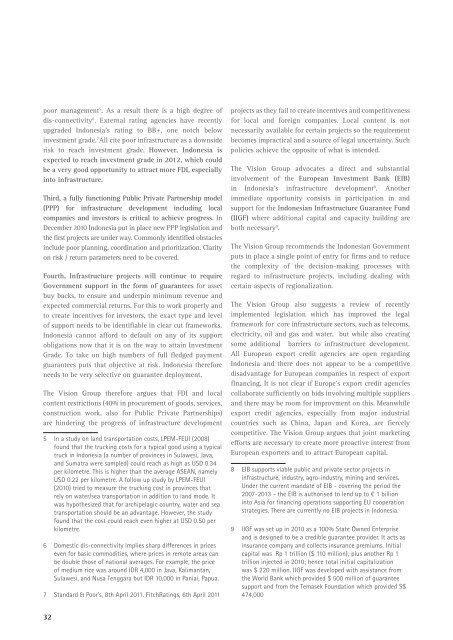Vision Group Report: Invigorating the Indonesia-EU Partnership
Vision Group Report: Invigorating the Indonesia-EU Partnership
Vision Group Report: Invigorating the Indonesia-EU Partnership
Create successful ePaper yourself
Turn your PDF publications into a flip-book with our unique Google optimized e-Paper software.
poor management 5 . As a result <strong>the</strong>re is a high degree of<br />
dis-connectivity 6 . External rating agencies have recently<br />
upgraded <strong>Indonesia</strong>’s rating to BB+, one notch below<br />
investment grade. 7 All cite poor infrastructure as a downside<br />
risk to reach investment grade. However, <strong>Indonesia</strong> is<br />
expected to reach investment grade in 2012, which could<br />
be a very good opportunity to attract more FDI, especially<br />
into infrastructure.<br />
Third, a fully functioning Public Private <strong>Partnership</strong> model<br />
(PPP) for infrastructure development including local<br />
companies and investors is critical to achieve progress. In<br />
December 2010 <strong>Indonesia</strong> put in place new PPP legislation and<br />
<strong>the</strong> first projects are under way. Commonly identified obstacles<br />
include poor planning, coordination and prioritization. Clarity<br />
on risk / return parameters need to be covered.<br />
Fourth, Infrastructure projects will continue to require<br />
Government support in <strong>the</strong> form of guarantees for asset<br />
buy backs, to ensure and underpin minimum revenue and<br />
expected commercial returns. For this to work properly and<br />
to create incentives for investors, <strong>the</strong> exact type and level<br />
of support needs to be identifiable in clear cut frameworks.<br />
<strong>Indonesia</strong> cannot afford to default on any of its support<br />
obligations now that it is on <strong>the</strong> way to attain Investment<br />
Grade. To take on high numbers of full fledged payment<br />
guarantees puts that objective at risk. <strong>Indonesia</strong> <strong>the</strong>refore<br />
needs to be very selective on guarantee deployment.<br />
The <strong>Vision</strong> <strong>Group</strong> <strong>the</strong>refore argues that FDI and local<br />
content restrictions (40% in procurement of goods, services,<br />
construction work, also for Public Private <strong>Partnership</strong>s)<br />
are hindering <strong>the</strong> progress of infrastructure development<br />
5 In a study on land transportation costs, LPEM-F<strong>EU</strong>I (2008)<br />
found that <strong>the</strong> trucking costs for a typical good using a typical<br />
truck in <strong>Indonesia</strong> (a number of provinces in Sulawesi, Java,<br />
and Sumatra were sampled) could reach as high as USD 0.34<br />
per kilometre. This is higher than <strong>the</strong> average ASEAN, namely<br />
USD 0.22 per kilometre. A follow up study by LPEM-F<strong>EU</strong>I<br />
(2010) tried to measure <strong>the</strong> trucking cost in provinces that<br />
rely on water/sea transportation in addition to land mode. It<br />
was hypo<strong>the</strong>sized that for archipelagic country, water and sea<br />
transportation should be an advantage. However, <strong>the</strong> study<br />
found that <strong>the</strong> cost could reach even higher at USD 0.50 per<br />
kilometre.<br />
6 Domestic dis-connectivity implies sharp differences in prices<br />
even for basic commodities, where prices in remote areas can<br />
be double those of national averages. For example, <strong>the</strong> price<br />
of medium rice was around IDR 4,000 in Java, Kalimantan,<br />
Sulawesi, and Nusa Tenggara but IDR 10,000 in Paniai, Papua.<br />
7 Standard & Poor’s, 8th April 2011. FitchRatings, 6th April 2011<br />
32<br />
projects as <strong>the</strong>y fail to create incentives and competitiveness<br />
for local and foreign companies. Local content is not<br />
necessarily available for certain projects so <strong>the</strong> requirement<br />
becomes impractical and a source of legal uncertainty. Such<br />
policies achieve <strong>the</strong> opposite of what is intended.<br />
The <strong>Vision</strong> <strong>Group</strong> advocates a direct and substantial<br />
involvement of <strong>the</strong> European Investment Bank (EIB)<br />
in <strong>Indonesia</strong>’s infrastructure development 8 . Ano<strong>the</strong>r<br />
immediate opportunity consists in participation in and<br />
support for <strong>the</strong> <strong>Indonesia</strong>n Infrastructure Guarantee Fund<br />
(IIGF) where additional capital and capacity building are<br />
both necessary 9 .<br />
The <strong>Vision</strong> <strong>Group</strong> recommends <strong>the</strong> <strong>Indonesia</strong>n Government<br />
puts in place a single point of entry for firms and to reduce<br />
<strong>the</strong> complexity of <strong>the</strong> decision-making processes with<br />
regard to infrastructure projects, including dealing with<br />
certain aspects of regionalization.<br />
The <strong>Vision</strong> <strong>Group</strong> also suggests a review of recently<br />
implemented legislation which has improved <strong>the</strong> legal<br />
framework for core infrastructure sectors, such as telecoms,<br />
electricity, oil and gas and water, but while also creating<br />
some additional barriers to infrastructure development.<br />
All European export credit agencies are open regarding<br />
<strong>Indonesia</strong> and <strong>the</strong>re does not appear to be a competitive<br />
disadvantage for European companies in respect of export<br />
financing. It is not clear if Europe’s export credit agencies<br />
collaborate sufficiently on bids involving multiple suppliers<br />
and <strong>the</strong>re may be room for improvment on this. Meanwhile<br />
export credit agencies, especially from major industrial<br />
countries such as China, Japan and Korea, are fiercely<br />
competitive. The <strong>Vision</strong> <strong>Group</strong> argues that joint marketing<br />
efforts are necessary to create more proactive interest from<br />
European exporters and to attract European capital.<br />
8 EIB supports viable public and private sector projects in<br />
infrastructure, industry, agro-industry, mining and services.<br />
Under <strong>the</strong> current mandate of EIB - covering <strong>the</strong> period <strong>the</strong><br />
2007-2013 - <strong>the</strong> EIB is authorised to lend up to € 1 billion<br />
into Asia for financing operations supporting <strong>EU</strong> cooperation<br />
strategies. There are currently no EIB projects in <strong>Indonesia</strong>.<br />
9 IIGF was set up in 2010 as a 100% State Owned Enterprise<br />
and is designed to be a credible guarantee provider. It acts as<br />
insurance company and collects insurance premiums. Initial<br />
capital was Rp 1 trillion ($ 110 million); plus ano<strong>the</strong>r Rp 1<br />
trillion injected in 2010; hence total initial capitalization<br />
was $ 220 million. IIGF was developed with assistance from<br />
<strong>the</strong> World Bank which provided $ 500 million of guarantee<br />
support and from <strong>the</strong> Temasek Foundation which provided S$<br />
474,000

















